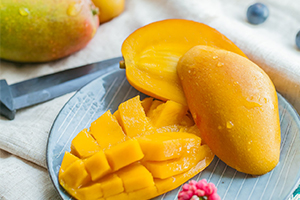 Mango is a member of the Anacardiaceae botanical family which also includes cashews and pistachios.
Mango is a member of the Anacardiaceae botanical family which also includes cashews and pistachios.
Mango is a stone fruit, otherwise known as a drupe. It has an outer skin with a fleshy, edible portion surrounding a single seed.
Though 75% of mangos are grown in Asia, those found in grocery stores in the United States are mainly grown in Florida, Mexico, Haiti, and South America.
Hundreds of mango varieties exist. The six most common varieties include Honey, Francis, Haden, Keitt, Kent and Tommy Atkins. Each variety is available during different times of the year and consists of distinctive flavors and textures.
Purchasing, Selecting, Storing, and Preparing
- Purchase different mango varieties fresh at grocery stores year round.
- Choose mangos that are plump and rounded.
- When gently pressed, mangos will give slightly when ripe. The color of a mango does not determine its ripeness as mango colors vary.
- Avoid mangos that are overly soft or have wrinkled skin.
- Unripe mangos will ripen if left out on your counter for 2-4 days. Once ripe, refrigerate to stop them from ripening further.
- Prepare by placing the mango upright on its side with the stem facing forward. Cut vertically down ¼ inch from the middle on each side. This will avoid the oblong seed contained in the middle of the mango. Next, cut each side of flesh in a grid pattern, being careful not to cut all the way through the skin. Use a large spoon to scoop the flesh free from the mango skin.
- Enjoy mango by itself, add to a salad, smoothie, salsa or puree and make into a dressing.
Nutrition Information
Mango is good source of fiber, vitamin B6, and an excellent source of vitamin A and vitamin C:
- Fiber aids digestion by helping to prevent constipation. It is also helpful for weight control due to helping you feel full faster, thus reducing the amount of food you eat.
- Vitamin B6 assists in red blood cell formation and nervous system performance.
- Vitamin A supports growth and development, immune function, and reproduction.
- Vitamin C is an antioxidant which aids in the absorption of iron and helps to heal wounds.
Nutrition Facts
Mango, 1 cup, diced
- Calories: 99
- Protein: 1.35 g
- Fat: 0.627 g
- Carbohydrate: 24.7 g
- Fiber: 2.64 g
- Calcium: 18.2 mg
- Iron: 0.264 mg
- Magnesium: 16.5 mg
- Phosphorus: 23.1 mg
- Folate: 71 µg
- Vitamin A: 89.1 µg
Via fdc.nal.usda.gov
Recipes
Request an Appointment